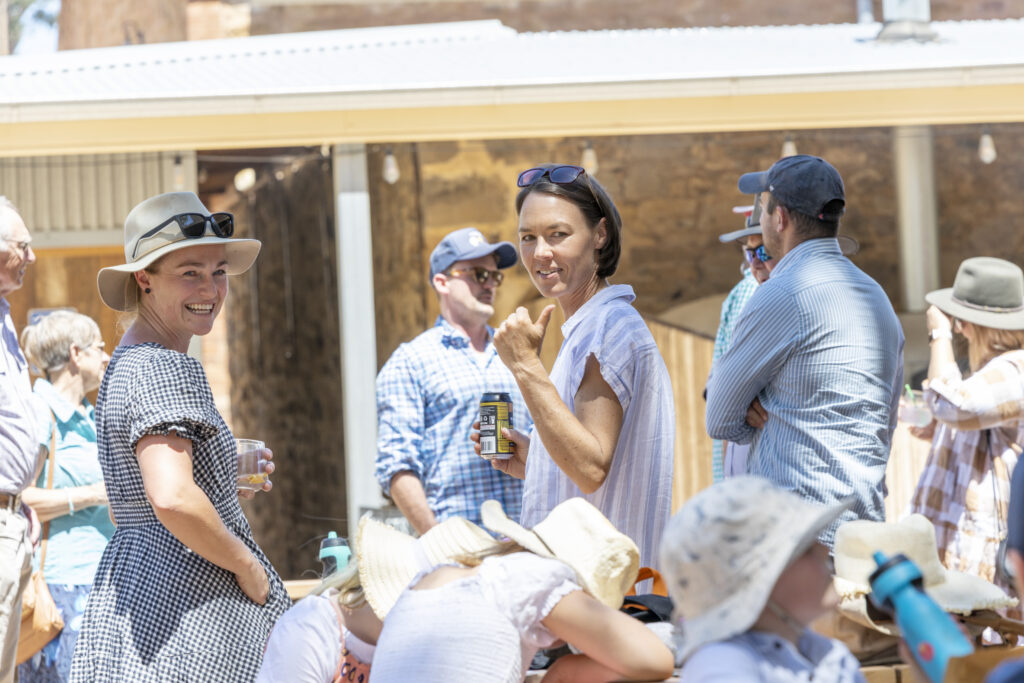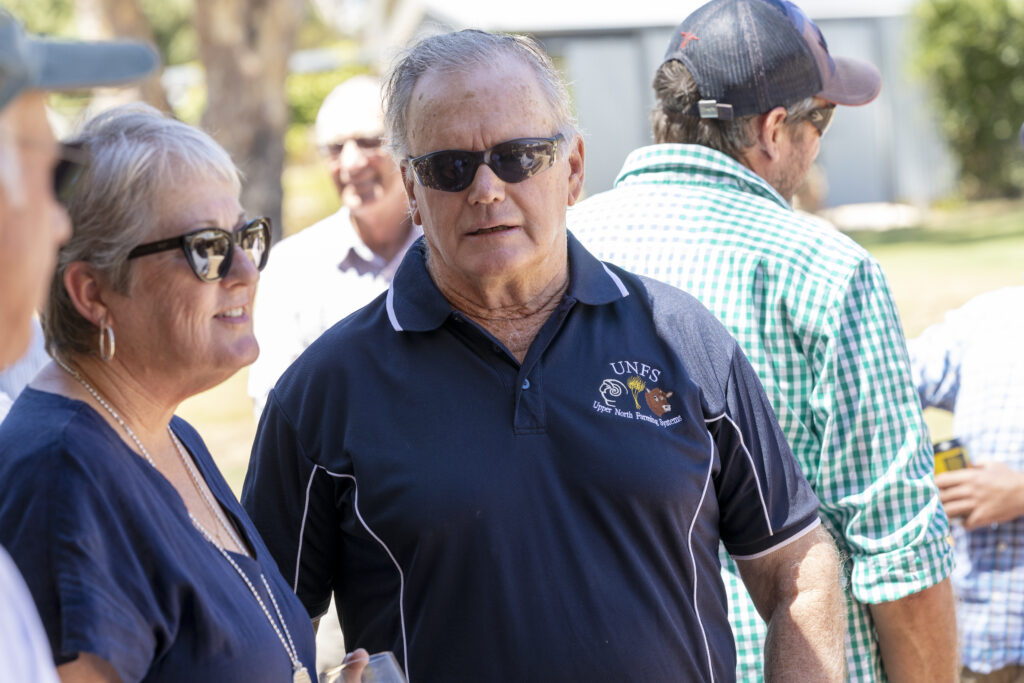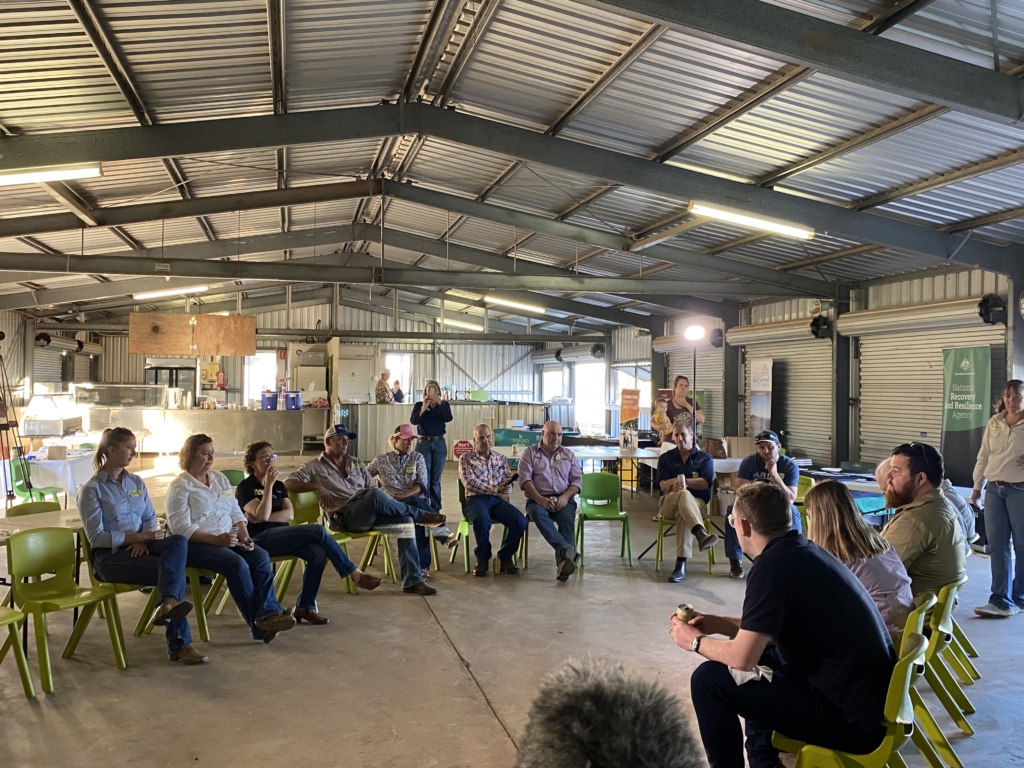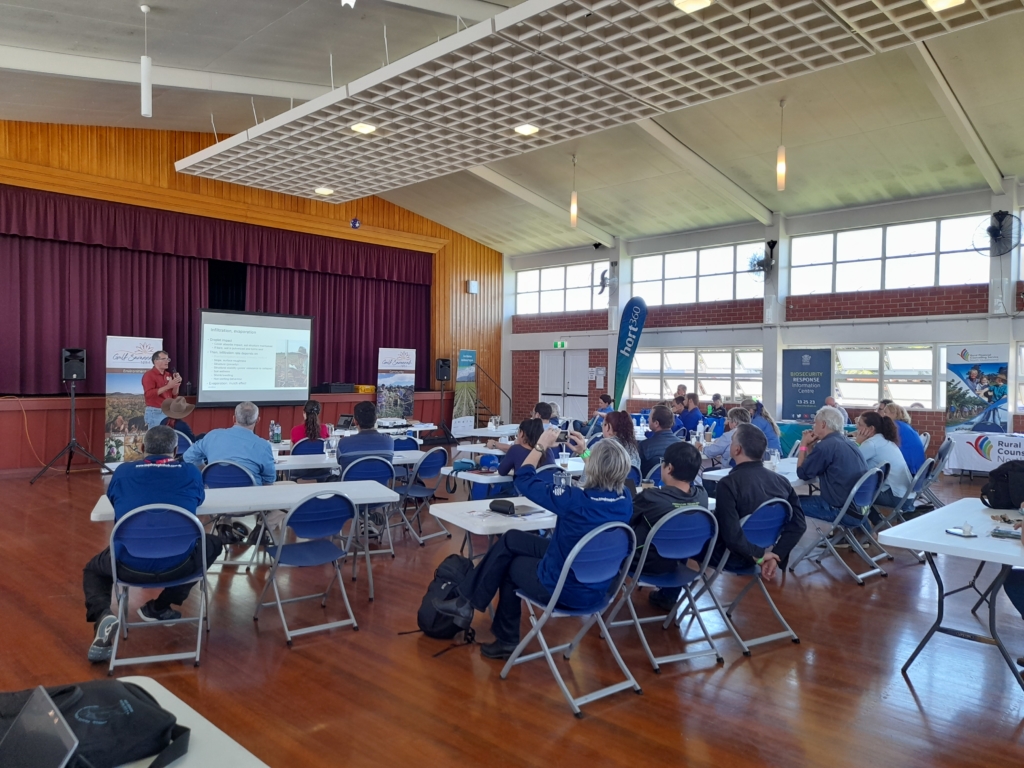Foundation for Rural & Regional Renewal (FRRR)
Upper North Farming Systems’ (UNSF’s) mission is to facilitate capacity building and empowerment of the agricultural community across the upper north region of South Australia. The group focuses on adapting and connecting farmers so they can learn from each other and from their shared experiences, and not farm in isolation. They do this by bringing farmers together in what they call Hubs. It’s a large and diverse geographical area, encompassing Booleroo Centre, Crystal Brook, Hallet, Jamestown, Laura, Peterborough, Nelshaby, Orroroo, Quorn and Wilmington. It’s a harsh climate, and when times are tough, they are very tough. The region has experienced significant declines in population and services over the past 30 years and the social fabric of communities in many areas has become frayed.
With the majority of communities in the region still reliant on agriculture, the social toll of the latest drought – the longest dry on record in 2020/21 – was evident, with symptoms of volunteer burn-out, self-isolation and mental health related issues.
Farmers know technology is essential, and farming systems have evolved significantly since the previous major drought, with stubble retention, improved efficiency of water use and a better understanding of livestock nutrition.
These communities are adaptable, open to innovation and aided through programs that promote not only professional connection, but also social and community connections, especially as these areas are typically not well-serviced by government research bodies and private consultants.
There are currently 11 Hubs under UNFS – eight geographical Hubs: Booleroo / Appila, Morchard / Orroroo / Pekina / Black Rock, Melrose, Gladstone / Laura, Jamestown, Nelshaby, Quorn and Wilmington and three non-geographic Hubs: Ladies on the Land, New Farmers and the Ag Tech Hub. The establishment of the Hubs in 2019 recognised the need to retain networks within the group and foster the tackling of issues on a smaller scale, as well as the importance of coming together on a social level.
A $20,000 Networks to Build Drought Resilience grant enabled UNFS to deliver the ‘Tools, Tech and Transformation’ workshop for farmers and agribusinesses. The key event was followed by a series of nine Hub events to provide the opportunity for networking, info-sharing, and learning about new farming systems and techniques to improve drought resilience. A ‘farmer-to-farmer’ learning model was recognised as a valuable and efficient mechanism to improve the productivity, profitability and sustainability of the agricultural industry in low rainfall zones.
The project reached 205 participants across 10 events that spanned six sector networks (Farm Business, Research Institute, NFP’s / Community Organisations, Consultants, Off Farm Business, Government Agency). Targeting farmers and agri-business directly, attendees learnt about tools aimed at improving efficiencies, sustainability and outcomes of operations like automatic feeding, as well as technology evolutions and business systems like satellite imagery on the farm scale, and succession and transition planning. Importantly, the solutions offered were all commercially available to be adopted on-farm, and farmers were able to speak directly with professionals in the fields, with discussions encouraged. They left with upto-date knowledge to help them build more resilient farming systems.
The Hub events ensured accessibility for farmers who couldn’t afford too much time away from their land. They were able to talk with neighbours and researchers about the outcomes of the 2021 season and what they might be able to do better next time. Questions like when and how to de-stock, how to ensure you’re looking after genetics and bloodlines, and considerations around agisting, planting times, and upgrading tech vs repairing machinery were raised. Each Hub session included a training session in a tool, tech or system (identified from the key event by their elected Hub Representative), as well as a planning session identifying how to implement the new skills and knowledge on-farm, and where they require additional support.
Through the project, participants built knowledge and understanding of the risks posed by drought and climate change and learnt new concepts on a range of topics that can be adapted for drought and climate preparedness.
Communities had the opportunity to connect, train, converse (something many would not normally do in their usual day-to-day business) and lean on systems and each other so they are more prepared for future challenges
At the 2020 ABC Heywire Regional Youth Summit in Canberra, 37 young regional Australians developed six exciting ideas to create a better future for young people across Australia. One of those ideas was We Need Farmers – educating and taking younger generations behind the scenes of farming. Timothy, Ebony and Taylor were the Heywire team behind the We Need Farmers project concept. They hoped that the project would increase the level of awareness and understanding that everyone has of Australia’s farmers. And especially, the hard work, time and effort that’s required to produce the produce for our nation.
“Our family farm is a third generation working farm. I love being there. The welcoming smell of the fresh air and the vast open landscapes. However, when my dad was a kid… they had 52 horses. Now there are 2. And over the last 25 years… our sheep numbers have fallen by 70%. We Need Farmers would help educate students on the hard work, time and effort that is required to stock those supermarket shelves and keep you full.”
Ebony, 2020 Heywirer, Western Australia
Gulf Youth in Ag was one of three groups that responded to the We Need Farmers project concept, receiving a grant for $9,979 to deliver a series of Paddock to Plate microdocumentaries.
Gulf Youth in Ag is an initiative of the Northern Gulf Resource Management Group (now Gulf Savannah NRM) that supports youth in the Gulf who are looking towards careers in sustainable agriculture. They support youth to engage with the agriculture industry with projects and networks to support young people.
The grant, which was funded by Friends of FRRR, enabled 12 members of the Gulf Youth in Ag group to complete a three-day intensive Film Making 101 course with a local production company. Students learnt film and sound production, developed storyboards, and the basics of editing.
Participants then formed three groups and chose a local farm to develop a film about the paddock to plate journey of the farm’s produce, to illustrate why we need farmers. They spent two days capturing farm footage and stories and interviewing the farmers.
The Paddock to Plate videos were launched to an audience of more than 70 local farmers, education providers, dignitaries and alumni of the Gulf Youth in Ag group. The finished videos were then distributed to 22 schools in the region and have been shared with the public through the Gulf Youth in Ag’s social media. The videos continue to be utilised in regional schools for use in the technology and science streams of the curriculum. The videos provide a resource for teachers to make the curriculum lessons relatable to the region.
Click on the image below to watch a short snippet explaining the project and showcasing the three videos.
The far northern tip of Queensland – Gulf country – extends from wide plains through to tropical rainforest, but mostly comprises dry tropical savannah country. It s a very isolated region, yet is a productive beef grazing area, with some areas of horticulture. About 10,000 people live in 234,000 square kilometres – an area the equivalent size of Victoria. About 25% of people in the Gulf region identify as Indigenous.
Gulf Savannah Natural Resource Management (GSNRM) connects science, technology and landcare to improve productivity for farmers and graziers. Drought is a common challenge, with frequent extended dry seasons recorded over the last 30 years. GSNRM saw an opportunity to bring together producers for a series of forums across the region to strengthen networks and generally build the community’s capacity to better respond to the impacts of drought. They were supported by a Future Drought Fund Networks to Build Drought Resilience grant of $49,700.
To make the most of the time, organisers planned a farm visit during the Farming Forum, followed by information sessions and a lunch. With most graziers travelling long distances, their session was over two days, providing an opportunity for participants to not only gain new knowledge and skills but also reinforce and strengthen connections between these very isolated residents at social events. The face-to-face events provided a mix of guest speakers to impart knowledge and practical implementation skills or planning sessions to start putting the ideas into action. This included building
understanding of the risks posed by drought by exposing participants to discussions about the future of the region in the face of adverse climatic conditions and then discussing potential solutions. This approach empowered community members to make business resilience changes and fostered partnerships and collaboration between growers, graziers, agronomists, extension officers, industry, drought hub and government.
The organisers also recognised that, by far, the greatest risk posed by drought and the unpredictable nature of climate change is deteriorating mental health. The Unbreakable Success Matrix program, which involved online learning supported by live group discussions and mentoring, gave people the tools to mentally cope with those elements of their lives that cannot be controlled. This structure enabled geographically diverse individuals to come together over several weeks and develop an understanding of how others are coping or not coping, and receive the benefits of listening to the coaching and ideas from the facilitators.
Regular touch points enabled people to get to know each other better and therefore, as the program progressed, saw more vulnerable sharing and thus greater problem solving within the group. Assessment showed the ‘fear factor’ had significantly reduced for all respondents.
These events had the support of the Gulf Cattlemen’s Association and the FNQ Growers Association and were promoted widely through a range of different databases. This ensured a diverse cross-section of the community participated, beyond those that GSNRM normally engages with.
In total, 106 people participated in the three events, ranging from 15 to 74 years, although around 80% were aged 45-64. Around 15% were 15-24. Participants were often intergenerational and reflected a mix of new and established residents and was reflective of the general community.
The opportunity to contemplate drought and climate change in a supportive atmosphere and consider how prepared they are, or not, saw 42% of respondents say that the forums had ‘definitely prompted‘ them to change something in their business, while another 25% said they were ‘somewhat prompted’. Almost 100% of all respondents said that each speaker session was either ‘very valuable‘ or ’valuable’. For the GSNRM group itself, their network has increased dramatically and it has also seen significant increases in the interconnections between virtually all aspects of the
industry, especially across sectors.






